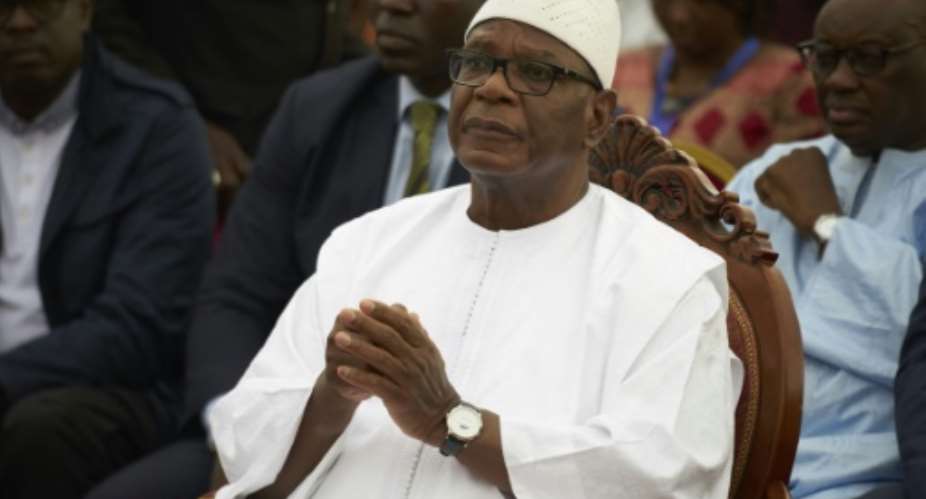Malian President Ibrahim Boubacar Keita, who notched up a landslide re-election victory on Thursday, has built a reputation as an uncompromising leader.
The 73-year-old won 67 percent of the vote pitting him against his former finance minister Soumaila Cisse in a run-off on Sunday, though the opposition has vowed to contest the outcome.
"He believes in strong, centralised power, that is for sure," said former colleague Boubacar Bah.
Keita, known universally by his initials IBK, is described variously by his entourage as generous, irascible and divisive.
He is also surgically precise in his French, prone to using the imperfect subjunctive -- a mode usually only seen in high-flown literature -- in his speeches.
The polls saw the native of Koutiala, a southern city near the border with Burkina Faso, fight off challenges by no fewer than 23 candidates, some of whom had served on his cabinet.
On the campaign trail, opponents accused Keita of spending too much time accepting awards abroad while jihadist and ethnic violence raged in the north and centre of the country.
"He did not manage to solve the country's major issues: the return to peace and the issue of insecurity," said Abdoulaye Cisse, who supported former prime minister and poll candidate Modibo Sidibe.
Keita, who had five successive prime ministers during his first term, waved off criticism.
"There is 'IBK-bashing' and 'Mali-bashing', which could last for awhile and to which I pay no heed," Keita told AFP in a pre-election interview. "Let me tell you, IBK is not a shrinking violet, he has no reason to be."
Keita, who also garnered an overwhelming majority in his 2013 election, maintains that he has helped to stabilise the country in the heart of the fragile Sahel region.
Mali has been gripped by violence since jihadists exploiting a 2012 ethnic Tuareg separatist uprising took over key cities in the north.
The extremists were largely driven out in France's Serval operation launched in January 2013 -- but large stretches of the country remain lawless, and hundreds have died this year alone in inter-communal violence and jihadist attacks.
But in the AFP interview the president said Mali faces only "pockets of violence and remnants of terrorism", defending Bamako's "colossal financial effort" in fighting the unrest.
Speaking to reporters on the return flight from a tour of three African countries to woo diaspora voters, he said: "There's no more war-mongering in Mali today."
Rise to the top
After studying literature in his home country, Senegal and France -- his great-grandfather was a French colonial soldier who died in the Battle of Verdun in World War I -- Keita became an advisor for the EU's overseas development fund before heading a development project in northern Mali.
He campaigned against general Moussa Traore, Mali's former president ousted in 1991 by a military coup.
He then rose through the ranks under Alpha Oumar Konare, the country's first democratically elected president.
As a socialist prime minister between 1994 and 2000, he quelled a series of crippling strikes, earning a reputation as a firm leader and helping to set up his landslide election in 2013.
Rumours regularly surface about Keita's health, which he also dismissed: "It may surprise a lot of people, but I feel perfectly fine."





 Avoid pre-registered SIMs, buyer and seller liable for prosecution – Ursula Owus...
Avoid pre-registered SIMs, buyer and seller liable for prosecution – Ursula Owus...
 Election 2024: Mahama has nothing new to offer Ghanaians, Bawumia is the future ...
Election 2024: Mahama has nothing new to offer Ghanaians, Bawumia is the future ...
 OSP files fresh charges against ex- PPA Boss
OSP files fresh charges against ex- PPA Boss
 Withdraw unreasonable GH¢5.8m fine against former board members – ECG tells PURC
Withdraw unreasonable GH¢5.8m fine against former board members – ECG tells PURC
 Akroma mine attack: Over 20 armed robbers injure workers, steal gold at Esaase
Akroma mine attack: Over 20 armed robbers injure workers, steal gold at Esaase
 Those who understand me have embraced hope for the future — Cheddar
Those who understand me have embraced hope for the future — Cheddar
 Ghana will make maiden voyage into space should Bawumia become President — Chair...
Ghana will make maiden voyage into space should Bawumia become President — Chair...
 Train crash: Despite the sabotage, we shall not be deterred and will persevere —...
Train crash: Despite the sabotage, we shall not be deterred and will persevere —...
 Tema-Mpakadan railway project a perversion of the original viable concept design...
Tema-Mpakadan railway project a perversion of the original viable concept design...
 Train crash: Elsewhere, everyone involved in the test will either be fired or re...
Train crash: Elsewhere, everyone involved in the test will either be fired or re...
